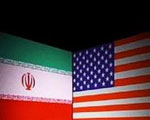 US News and World Report: Iran’s choice to fill a U.N. post with a reported participant in the 1979 U.S. embassy takeover and subsequent hostage crisis in Tehran may have been a test shot designed to see how many allowances the White House would make before imposing hard lines against Iran.
US News and World Report: Iran’s choice to fill a U.N. post with a reported participant in the 1979 U.S. embassy takeover and subsequent hostage crisis in Tehran may have been a test shot designed to see how many allowances the White House would make before imposing hard lines against Iran.
Clerics are likely trying to see how far they can push.
US News and World Report
By Paul D. Shinkman
Iran’s choice to fill a U.N. post with a reported participant in the 1979 U.S. embassy takeover and subsequent hostage crisis in Tehran may have been a test shot designed to see how many allowances the White House would make before imposing hard lines against the Middle Eastern nation.
Tehran this week directly petitioned U.N. Secretary-General Ban Ki-moon to allow Hamid Aboutalebi to serve as its envoy to the New York headquarters. White House spokesman Jay Carney confirmed on Friday the U.S. would not issue a visa to the senior diplomat, believed to have participated in the 1979 incident during which 52 American diplomats and citizens were detained for 444 days.
Carney said only that President Barack Obama’s concerns aligned with those of Congress, which passed legislation earlier that would bar Aboutalebi from receiving a visa.
Iran’s request and the U.S. refusal comes at a crucial time for the Middle Eastern nation and its relations abroad, after negotiations only recently began over Iran’s nuclear program.
The Iranian government said in a formal letter of complaint this week that it has “serious concern” over what it believes is a clear breach of rules governing the U.S. as the host country for the U.N., according to a copy of the letter reviewed by The New York Times.
Iran said the U.S. decision is unprecedented and in violation of international law.
Under U.N. regulations, the U.S. is obliged to provide visas to foreign delegates unless it has specific terrorism or espionage concerns.
One opposition group thinks Iran’s theocratic chiefs underestimated the U.S. response and believed the Obama administration’s emphasis on diplomacy would force it to overlook Aboutalebi’s reported history.
“What undermined [Iran’s] calculation, perhaps, was strong congressional action,” says Ali Safavi, a spokesman in Washington, D.C., for the Paris-based National Council of Resistance of Iran, which has dubbed itself a “parliament in exile.”
The NCRI says Aboutalebi has been an active part of what it considers the Iranian government’s culture of kidnapping and assassination. After serving as Iran’s ambassador to Italy until 1992, the NCRI believes Aboutalebi returned to oversee the 1993 assassination of Mohammad Hossein Naghdi, the group’s representative in Italy at the time.
“You do not become a senior official within [the Iranian] regime unless they’re absolutely confident of your loyalty to the policies,” Safavi says.
The Iranian government denies the NCRI’s claims about Aboutalebi, and says the group is trying to capitalize on the diplomat’s media attention. The NCRI has close ties to Mujahedin-e Khalq, a revolutionary group that the U.S. previously listed as a terrorist organization. Then-Secretary of State Hillary Clinton removed it from that list in 2012.
The U.S. and Iran remain in a standoff over Aboutalebi, with both sides waiting to see which will back down first. A former Iranian government insider believes this latest dispute further erodes an already strained relationship.
“I believe Tehran did not anticipate nor predict such harsh response from the U.S. Congress and President Obama,” says Seyed Hossein Mousavian, who until 2005 was a spokesman for Iran’s nuclear negotiations. He served as the Iranian ambassador to Germany in the 1990s, and later as head of the Foreign Relations Committee in the Iranian National Security Council.
Abutalebi is an experienced career diplomat who is respected in the Iranian Foreign Ministry, Mousavian says, but the U.S. has made a decision on behalf of the U.N. that goes against international law.
Mousavian, now affiliated with Princeton University, cautions that the U.S. action could affect future negotiations with Iran over containing its nuclear program, as well as general good will between the two countries.
“The nuclear negotiations would continue. However, Washington’s decision to reject the visa for Ambassador Abutalebi does not bode well for broader U.S.-Iran cooperation on major regional and international issues,” he says.


